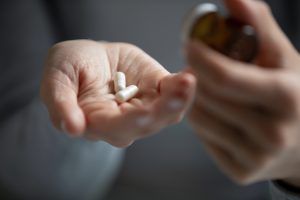 Young adults with PTSD may have an increased risk of stroke when taking certain types of antidepressants, according to new research. The study published in the American Heart Association journal Stroke was the largest investigation of post-traumatic stress disorder and antidepressant-associated stroke risk in young adults ever performed.
Young adults with PTSD may have an increased risk of stroke when taking certain types of antidepressants, according to new research. The study published in the American Heart Association journal Stroke was the largest investigation of post-traumatic stress disorder and antidepressant-associated stroke risk in young adults ever performed.
Collecting data from 1.1 million U.S. veterans over a total of 13 years, researchers analyzed those who had PTSD and were taking prescription drugs. Specifically, researchers zeroed in on the stroke risk among those who had PTSD and those who took two types of medications that are commonly used to treat PTSD. These included selective serotonin reuptake inhibitors, or SSRIs, and serotonin and norepinephrine reuptake inhibitors, or SNRIs.
Advertisement
Past research has found that young adults with PTSD may be more likely to have a major stroke or transient ischemic attack, called a TIA, by middle age. Many people think of stroke as an older person’s disease. For adults younger than 45, almost half of all strokes are hemorrhagic, which occurs when a weakened blood vessel ruptures and bleeds into the brain.
This new study added to this mounting evidence by finding a 45% greater risk of hemorrhagic stroke in those taking SSRI medication.
“These results suggest that SSRI use may be a potent risk factor for developing hemorrhagic stroke at young ages,” said lead author Allison Gaffey.
“Unfortunately, stroke cases among young adults are on the rise,” she added. “Traditional risk factors for stroke, such as hypertension or high blood pressure, may relate to some of the increase, but it is also important to examine if other underappreciated factors could uniquely impact young adults.”
Unhealthy Lifestyle Behaviors
People with a history of trauma may be more likely to engage in unhealthy lifestyle behaviors such as smoking. They also tend to have other traditional risk factors for stroke, such as obesity. Even with these factors taken into account, the use of SSRIs remains a primary predictor of hemorrhagic stroke in young people.
Advertisement
Further research is needed to confirm exactly why SSRIs may increase stroke risk, but the medication has been found to reduce the ability of platelets to clot, decrease platelet count, and lead to bleeding in the stomach.
This study offers a new perspective on the treatment of PTSD, as researchers suggest prescribing other classes of antidepressants, such as SNRIs, or other treatments, such as cognitive behavior therapies. These treatments should be especially important for younger patients who have other risk factors for hemorrhage. Many cognitive behavioral therapies can offer excellent treatment of PTSD, yet they remain underused tools for the integrated treatment of mental health conditions.
Overall, physicians should use a tailored, personalized approach for managing the individual risk of stroke with younger patients. As more research becomes available, it is more evident that treatments are not a one-size-fits-all way of helping patients. If other risk factors for stroke are present in the patient, research shows they should not be prescribed potentially harmful medications.
